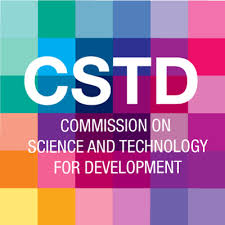High-level roundtable on the impact of rapid technological change on sustainable development
14 May 2019 10:00h - 12:00h
Event report
[Read more session reports and live updates from the 22nd Session of the Commission on Science and Technology for Development]
The high-level roundtable was moderated by Mr A Min Tjoa (Chair of the CSTD; Professor and Director, Institute of Software Technology and Interactive Systems, Vienna University of Technology, Austria) and was featured by presentations focusing on the impact of technological change and its raising challenges and opportunities.
Ms Pascale Fung (Professor, Hong Kong University of Science and Technology) focused her speech on human machine communication. As she explained, human communication starts at early stages, not with words, but with facial expressions. Despite the fact that human-machine communication has often been linked to science fiction, developments in artificial intelligence (AI) have developed robots able to imitate these facial expressions, currently capable of communicating with people. These intelligence systems are based on two kinds of speech and language technologies: a task oriented technology, which featured the early stages of AI, and a Chit Chat Box, which characterises current virtual assistant systems. Current technological developments such as but not limited to Microsoft’s chatter bot Tay, Amazon’s Echo, and Google’s Duplex have raised important points that need to be taken into account. First, it is crucial to identify and mitigate AI biases based of machine learning from human biases; and second, it is necessary to tackle gender biases in the developments of new technologies that today, for instance, tend to have female features for virtual assistants and male ones for intelligent machines.
Mr Donald Gotterbarn (Professor Emeritus, East Tennessee State University) talked about rapid technological change, focusing on implementing the positive aspects of AI, preventing harm from the negative ones, and developing an ethical approach for its development. Focusing on the notion of an ‘ethics crisis’, he explained that as ethics imply that any decision made impacts individuals, groups, and society, it is clear that if AI is able to make these decisions, it is crucial to assure that it is acting ethically. Current examples of AI ethics codes have been implemented by actors such as the European Union, Microsoft, and the Southern Baptists. Nonetheless, this is not enough, nor effective enough. He argued that talking about AI ethics is meaningless: It is people who are developing the software and assigning ethics to the technology. Additionally, it should be noted that talking about ethics does not imply a binary answer of ‘yes’ or ‘no’, but a dichotomy of ethical processes and actions. Furthermore, long lists of ethical codes do not solve the problem; a solution should be based on focusing the attention on a ‘never to do’ list which guarantee that AI is developed for positive applications. As the professor concluded, AI is not ethical, but it can perform tasks in a positive way when directed and enforced by people and software.
Mr Miltos Ladikas (Professor, German Institute for Technology Assessment and Systems) focused his speech on technology assessment (TA) and its global aspect. Defined as a scientific, interactive, and innovative process, technological assessment has at its main core the goal to foster the creation of public and political opinion on the societal aspects of science and technology. This practice plans to have functions ranging from policy advisory, to fostering public debate, and finally to engineering processes through scientific, interactive, and communication-based means and methods.
Ms Susan Cozzens (Professor Emerita, Georgia Tech) addressed the topic of rapid technological change and inequalities. As the professor explained, inequality between and within countries can be analysed through a vertical approach (rich-poor spectrum); and a horizontal one, in which it is possible to identify culturally defined groups (i.e. on gender, religion, etc.). The Fourth Industrial Revolution with its technological change has affected the means of production, creating innovation in the processes as well as in the creation of new products. Therefore, while new technologies can contribute to inequality they can also create benefits and create wealth. In this context, national policymakers need to foster innovation, and international organisations can contribute by sharing best practice examples and articulating public standards on a global scale.
The roundtable was then followed by a ministerial discussion featured by contribution from Mr Sujeewa Senasinghe (Minister of Science, Technology and Research of Sri Lanka) and Mr Elioda Tumwesigye (Minister of Science, Technology and Innovation of Uganda) who respectively highlighted the achievements made by both countries in updating their national strategies for implementing the benefits of science, technology and innovation. Senasinghe explained that the achievement of the SDGs can be boosted by the implementation of STI.
By Stefania Grottola
Related topics
Related event

22nd Session of the Commission on Science and Technology for Development
13 May 2019 16:30h - 17 May 2019 16:30h
Geneva, Switzerland
